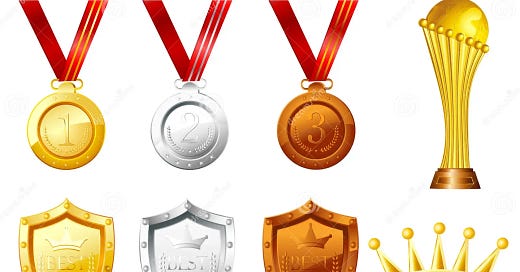As polls and asking LLMs didn’t give me much insight into which status markers are more adaptive, let me try to think the issue through myself. Here are six levels of status marker adaptiveness.
1 - Wasteful Signs: Consumption, Learning, Taste, Medicine - Signs of individual quality that induce great wasteful efforts to increase them.
2 - Safe Signs: Health, Looks - Signs of individual quality where its harder to waste lots in efforts to increase them.
3 - Norm Following: Honor/Loyalty, Generosity, Spiritual Purity, Honesty, Fairness - If your culture has good norms, there should be added value in rewarding adherence to them.
4 - Copy: Accomplished, Lineage: If your culture has good status markers, and good ways to evaluate accomplishments, then using these as status markers copies the good effects of other markers.
5 - Persuasion: Fame, Write/Talk Ability: Getting outsiders to adopt your cultural elements can be a big win in cultural evolution. But they have to be wiling to listen.
6 - Power: Power, Wealth, Autonomy: These directly and robustly enable your culture to win its conflicts with others, whether or not they are willing to listen.
6 - Conditional Levers: Inventive/creative , Combat Ability: In the right sort of cultural context, these greatly help your culture win its conflicts. And as they benefit the group more than the individual, they are especially good to encourage.
7 Fertility: This is just a robust direct win for your culture, if you can sustain it.
These scores (1-7) correlate 0.54 with polls on status averaged over history, but only 0.25 with US today. Suggesting cultural drift: status markers are less adaptive lately.















Im not sure when cultural norms have ever adapted to novel and speculative future scenarios. They usually consist of solutions to reoccurring problems in the groups’s past + adaptations to current circumstance. Has a culture ever done this?
Most of these status markers boil down to: We assign high status to people (and organizations, and cultures) that we deem to have a high degree of agency.
Wealth, success, health, beauty, strength, intelligence, charisma, influence, power, personality – all are predictors of how much agency a person has over their situation and the people around them. Hence their status implications; we want to align with and emulate those with high agency. The harder a signal is to fake, the more credence it has.
All of this seems orthogonal to your concept of cultural adaptiveness. Agency is a component of adaptability (or rather, a complete lack of agency makes it hard to adapt), but in itself agency doesn't guarantee useful adaptation: One can simply be pointed in the wrong direction.
Do you have a working definition of "cultural adaptiveness"? Clearly "at least replacement-level fertility" is a component, but I'm curious if you have a more general definition.